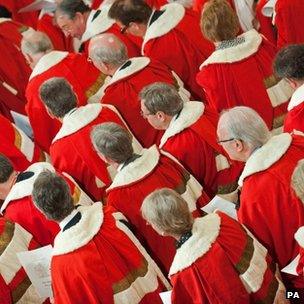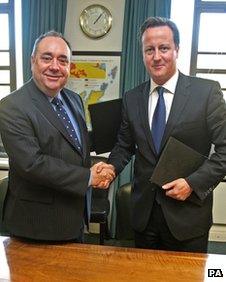Unhappy with the detail
- Published

The Lords are currently looking at the Scottish independence referendum
There is a susurration of mistrust - of anxiety, of concern - escaping lightly from the pages of the latest Lords report upon Scotland's proposed independence referendum.
The constitution committee of the Upper House has been casting an eye over the Edinburgh Agreement between the UK and Scottish Governments, particularly with regard to the proposal to transfer the power to hold a referendum from Westminster to Holyrood.
That temporary transfer - under Section 30 of the Scotland Act 1998 - requires to be agreed by both Houses at Westminster and by the Scottish Parliament before it is implemented. And their Lordships on the constitution committee are disquieted.
They like the fact that there will now be a legislative solution, a single question on independence and a lead role for the Electoral Commission in advising on the referendum. In such respects, they say that the agreement "accords with our previous recommendations".
They welcome the commitment of both governments that "the referendum should meet the highest standards of fairness, transparency and propriety". Basic democratic principle, they note, demands nothing less.
Put to rest
But they remain unhappy. Once the order is carried, control of the referendum - the Bill, the wording, the concomitant arrangements - shifts to Holyrood.
While they note the desire to have a process palpably "made in Scotland", they also comment with a degree of acidity that "it is hard to avoid the conclusion that more could have been done to include the United Kingdom Parliament in this process".

Alex Salmond and David Cameron agreed the referendum deal on 15 October
In short, they are inclined to view the Edinburgh Agreement, external as a private, exclusive deal between ministers - with an outcome which cuts Westminster out of ultimate scrutiny.
Further, they question whether the proposed arrangements entirely put to rest the prospect of legal challenge - which was a core objective.
Such might arise again, they speculate, should one of the governments breach the non-statutory parts of the agreement, leading "a concerned citizen" to feel aggrieved that "legitimate expectations" have been denied.
Translated, that means that their Lordships are concerned that the Scottish government - for that is what they mean - may have been given too much of a free hand.
More specifically, they are fretting about the referendum question - or, more precisely, its current absence.
They regard the Scottish government version - "do you agree that Scotland should be an independent country" - as flawed on four counts;
that it leads
that it asks about what Scotland is, rather than what it should become
that it refers to "country", not "state"
and that it does not specify that independence involves leaving the United Kingdom.
Such complaints have been made previously. Against that, those advocating this question say it is simple and readily understood - and that, given the months of campaigning, there will be nobody who is left unaware of the consequences of the vote.
Such issues, of course, are the very stuff of the scrutiny currently being undertaken by the Electoral Commission who are examining the intelligibility or otherwise of the question.
In essence, their Lordships are querying the existing question - and simultaneously warning the Scottish government against any attempt to overturn the recommendations which will emerge from the Commission.
'Work to do'
Their Lordships are similarly exercised about the current lack of certainty with regard to campaign finance. This will also be examined by the Commission.
Let us be clear. Today's report will not of itself reverse the process set in train by the Edinburgh Agreement. Such issues were well known to the negotiators - and still the Scottish Secretary agreed and, crucially, the PM offered his fiat.
But they are indications that the Section 30 Order will not be simply nodded through the Upper House. The Advocate General Lord Wallace has work to do.
PS: While we are on the topics of fairness and transparency, let us briefly talk football. Congratulations to Hibernian who scored two fine goals at Easter Road on Sunday. Snag is that Dundee United also scored two perfectly good goals - with only one of them counting because the referee and his assistant got it wrong.
Watching the rugby later, it was instructive to see the umpire call - twice - for video assistance in determining whether tries had been fairly scored. Could never happen in football, could it?